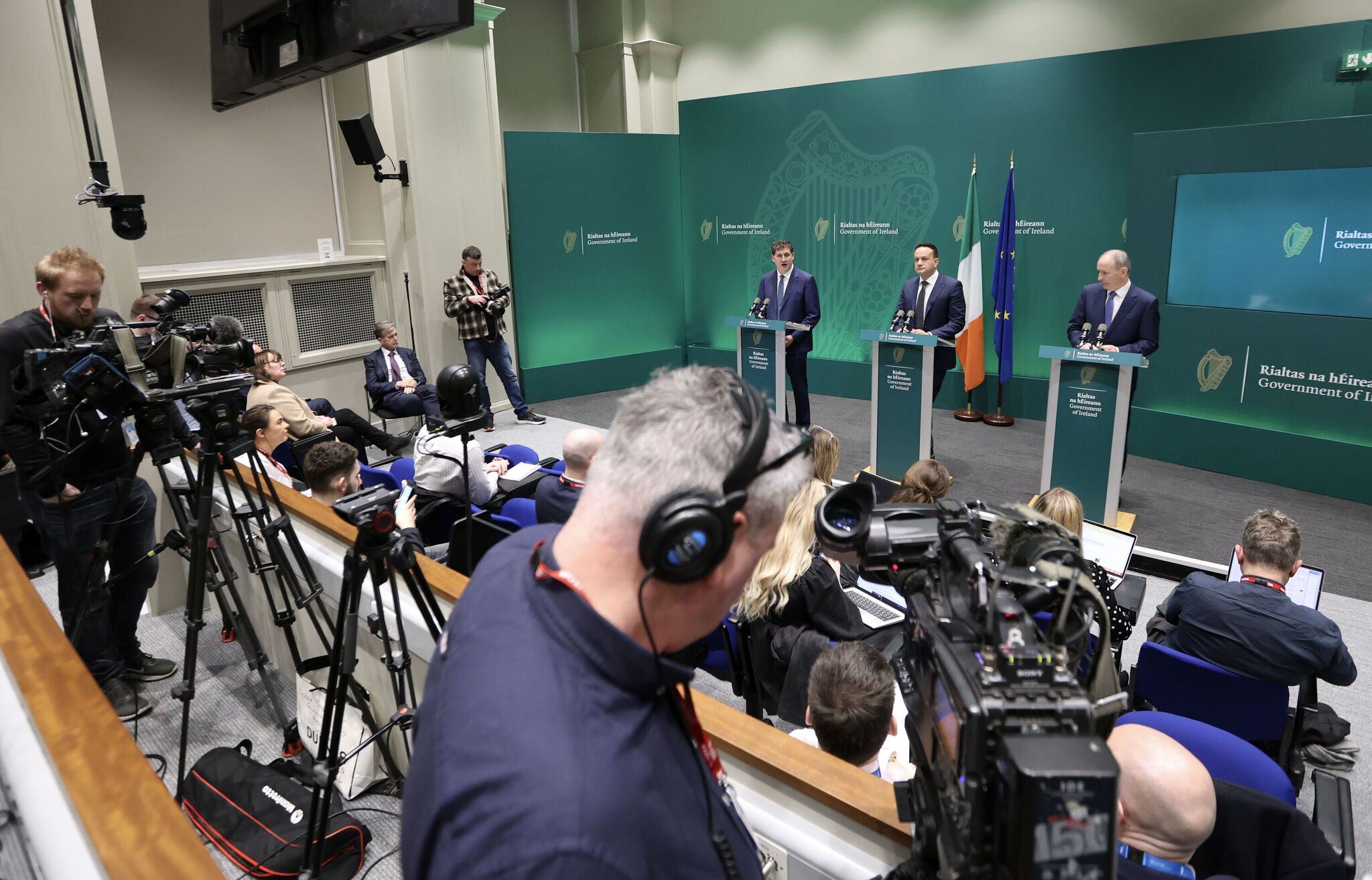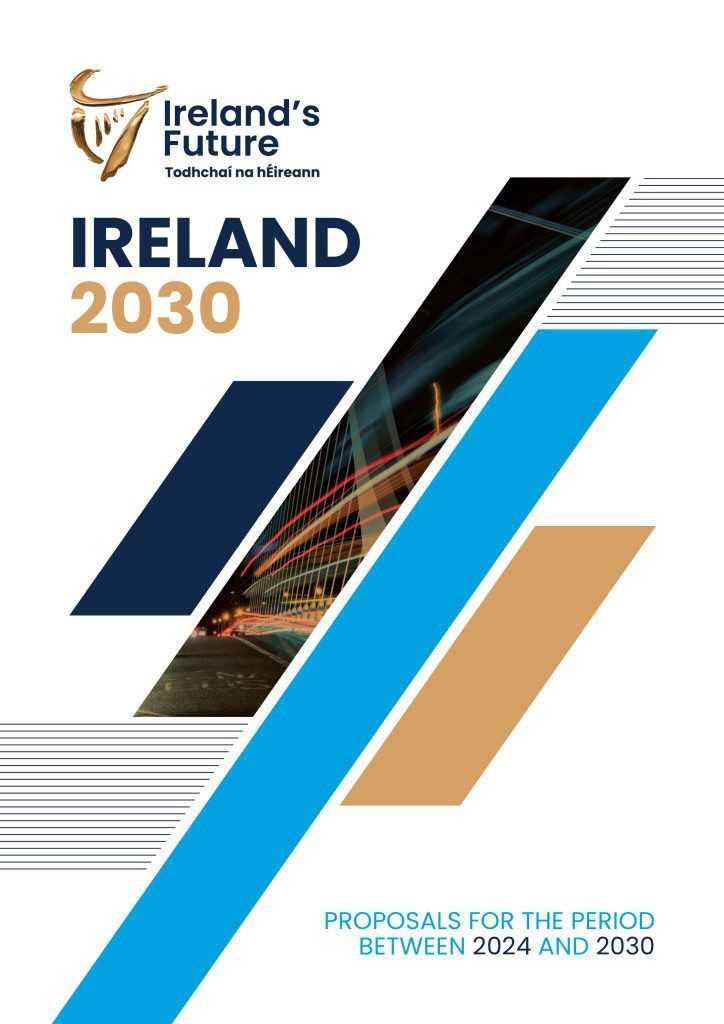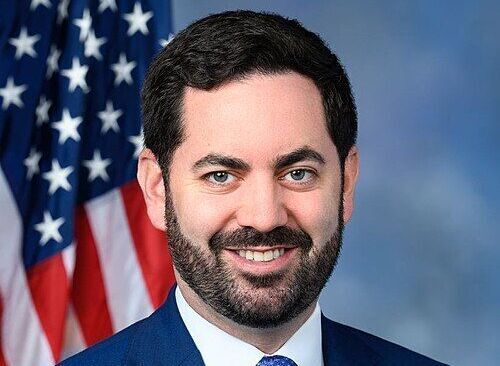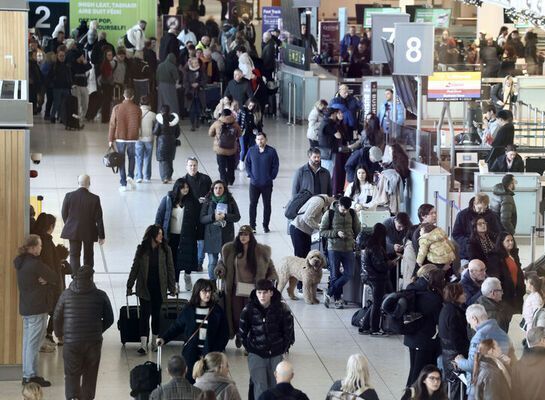The launch of the latest discussion paper from Ireland’s Future is a significant moment in the debate on constitutional change. "Ireland 2030" is a landmark publication. It sets out in clear, precise and accessible language practical ways forward on the path to a new and united Ireland.
It joins a growing body of serious and well-informed material that will be of assistance to those formulating next steps. I know, as a board member, that it flows from wide and deep consultation and discussion. As a determinedly civil society organisation we have worked hard to listen to diverse perspectives, while not avoiding the task ahead.
We have heard so often the desire to move beyond abstract and comforting generalisations that sound good but lead nowhere. There is an understandable impatience with warm words that raise expectations but offer little tangible progress. It is apparent at this stage that people increasingly want to see proposals, plans and timetables.
They are right to be fed up with prevarication, denial and unjustified delay. This document fills an existing gap and addresses an urgent need. It does so within the framework of the Good Friday Agreement, taking the promises there seriously, and recognises that Ireland is in a transition towards a border poll.
A bit of context will help in reflecting on Ireland’s Future. As is well known, we have organised major events across Ireland and internationally. We have brought people together from all backgrounds and professions.
And in doing so we are moving beyond traditional comfort zones. Like other civic groups in contested space, we have faced caricature, stereotype and worse - but we know enough about our peace process to understand the value of perseverance. The quiet, private words of encouragement are the most telling and what keep many of us going.
One of our initial aims - outlined in an earlier document - was to mainstream the discussion in everyday life in Ireland. We wanted to carve out room for the necessary deliberations, and by doing so break new ground. Brexit brought unwelcome new ingredients to the old arguments and inspired our determination to make real progress in the here and now.
INTERNATIONALLY ACCLAIMED
That sounds like an odd thing to say for what is a core part of our internationally acclaimed peace agreement. But we noticed that the chill factor was still there, and work was simply not being done.
People who should know better talked about our legitimate constitutional objectives as somehow divisive – and you can imagine how that was received by those in the North grappling with the consequences of Brexit. There were still people seeking to delegitimise the pursuit of our noble constitutional goal and undermine our collective right to a better future.
We needed to change that and thus also create safe spaces for others. It is hard to deny the impact of this extraordinary effort, given the sheer scale of engagement with our events, discussions and policy outputs, and it is impossible to avoid the constitutional conversation in Ireland and elsewhere today.
Avid followers of social media will have spotted the ongoing dialogue with political parties, and this is one of the more remarkable aspects of the work of Ireland’s Future. We have carefully constructed inclusive conversations based on a generous recognition of a broad range of other contributions and outputs. We have provided a platform to many voices and know the limitations of narrow and exclusive approaches.
This is, of course, is one of the enormous advantages of such a civil society movement. We do not face the same pressures of political survival and electoral success that the parties do. I had the privilege to be in attendance for those political meetings in the Oireachtas. While there is a tendency to dwell on what divides the parties, it is the extent of convergence that is notable, and the welcome we receive for such civic efforts to nurture consensus is striking.
These felt like significant interactions. A cursory glance at the catalogue of meetings arranged by Ireland’s Future demonstrates what has been achieved thus far. What remains apparent is the public appetite for preparation, planning, more information and choice.
From the beginning, Ireland’s Future has stressed all-island civic engagement and inclusive dialogue. That starting point was always conscious and deliberate. But our strong sense is that people want more focused effort and that remaining reservations over practical preparation need to be overcome. This new discussion paper thus enters that space and offers options and suggestions.
There is recognition of the significance of this moment on the island of Ireland, in particular the upcoming elections. If you are serious about achieving a new and united Ireland, then what will you be doing about it? There are suggestions targeted at those pondering manifestos and commitments with a view to, for example, the negotiation of the next Programme for Government.
The starting point, which in my view makes good sense, is that there is sufficient available evidence about patterns and trends to commence the process of governmental planning now. One of the risks of an exclusive focus on the criteria for a border poll is a tendency to shy away from active planning.
Make no mistake. The detailed work undertaken on mapping electoral outcomes and conducting polls and surveys is essential. The ARINS Project in particular has yielded invaluable insights into opinions, views and preferences, as well as the production of detailed research papers. Enough is known now to prepare.
It has always seemed odd not to be ready for the only other available constitutional option. The Ireland’s Future paper notes that a border poll may be called before the end of the decade and the approach favored is to adopt a defined timeframe.
Ireland 2030 https://t.co/UsnXK1ECAV
— Ireland's Future - Todhchaí na hÉireann (@IrelandsFuture) March 4, 2024
Thus, the title of the document. There is a preference for extensive and inclusive preparation and an acknowledgement of the valuable work that has been completed and is in progress. Much commentary avoids the fact that people will be given a choice through concurrent referendums.
POST-CONFLICT CONTEXTS
This appears to spring from a nervousness about the use of referendums in post-conflict contexts. The decision of Ireland’s Future, and others, to face into this, seems wise in circumstances where the denial of choice may well become unsustainable sooner than many imagine. The constitutional status quo will not simply wither away through an ill-defined mystical process.
People have the right to decide and that will mean voting. The new document presses on to the next phase towards shaping the production of a Programme for a New Ireland, through participative processes drawing on international and comparative experience. The aim is to give people an informed choice based on reliable and credible evidence.
What is noteworthy again is the willingness to listen and learn. There is open recognition of differing views on matters such as sequencing and timing, and that is because the aim is to construct a broad civic and political coalition.
The best thing to do at this point is note the main recommendations from the Executive Summary: Political parties supportive of a new and united Ireland must reflect next steps in their election manifestos, with particular reference to the options and indicative timeline outlined A Programme for Government commitment to preparation for constitutional change with the required governmental, political and civic structures and resources included.
A guarantee that planning for constitutional change will be given direct governmental attention as an agreed and specific objective. The outcome can be achieved in several ways. That is why our focus is on outlining options. TROIKA: Launching the Shared Island investment program last month were Irish Government leaders Leo Varadkar, Micheál Martin and Eamon Ryan. Pic: Rollingnews.ie
For example, the work might be undertaken through a dedicated department with the task of coordinating preparations, delivering ambitious proposals and promoting a ‘whole of government’ approach. We accept that there are other ways of doing this. If the Shared Island Initiative does continue, in any form, it must expand to align with this new overarching governmental focus.
The establishment of a dedicated Joint Committee of the Oireachtas on the Constitutional Future of the island of Ireland. The creation of a standing All-Island Civic Forum/Assembly/Dialogue as a mechanism to assist in the promotion of inclusive deliberation before, during and after. This must be resourced adequately and supplemented with additional civic initiatives, including work with universities.
Delighted to be at the Loyalism: Alternative Voices - Shrapnel Podcast Live event tonight as part of @ImagineBelfast pic.twitter.com/HBRlD0H1rw
— Colin Harvey (@cjhumanrights) March 23, 2024
We suggest imagination and creativity in designing the best possible civic mechanism to support participation on an ongoing basis. There are matters that will not be resolved before the referendums take place.
Public bodies and civil society organisations across the island must consider the implications of constitutional change for their strategic planning processes. Human rights, equality and environmental impact assessments - and associated values - must shape every stage.
There is much to learn from the innovative approaches already being used by civil society. The opportunity exists for a New Ireland to be world-leading in advancing transformative change.
The Irish Government must make effective use of its international partnerships to signal its intentions and prepare the diplomatic ground. The global goodwill towards this unifying project must be harnessed. A binding Joint Declaration must be adopted by both governments, within the framework of the British-Irish Intergovernmental Conference.
This Declaration to be informed by widespread consultation on the management of all stages of the referendum process in each jurisdiction.
There is much more of interest. The document also includes a detailed indicative timeline towards a border poll, with helpful suggestions throughout.
Agree or disagree with the approach adopted by Ireland’s Future, this moves the debate beyond the endemic policy inertia that often stands in the way of practical preparatory work.
I encourage everyone to engage with this new publication and to participate in the ongoing efforts to give the people of Ireland a meaningful choice.
I know that Ireland’s Future would be delighted to hear feedback on the latest proposals, and we remain deeply appreciative of all the assistance and support. If we get this constitutional project right, it will be a positive news story for the world.
Colin Harvey is a Professor in the School of Law, Queen’s University Belfast and a member of the management board of Ireland’s Future.Further information about the work of Ireland’s Future is available here. You can read more about Professor Colin Harvey’s work online.








